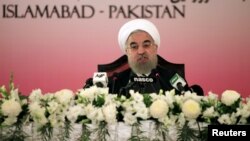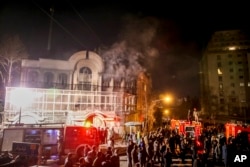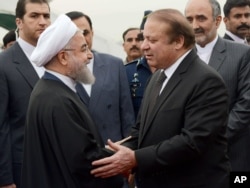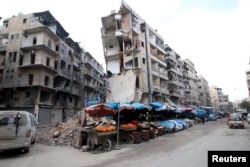Iranian President Hassan Rouhani says his country is ready to “do anything it can” to restore its relations with Saudi Arabia, for the sake of promoting progress and prosperity in the Muslim world.
Rouhani, who wound up a two-day visit to Pakistan Saturday, said he believes in resolving differences through talks, although direct talks between the two nations are unlikely in the short term.
Saudi Arabia broke off relations with Iran in January, when mobs stormed into the kingdom's embassy in Tehran to protest against the Saudis' execution of a Shi'ite religious leader.
Hope for a resolution
Speaking to reporters in Islamabad, Rouhani said Iran is "not interested in tension with Saudi Arabia."
"Iran is a very big country in the region and the Muslim world," he said. "Saudi Arabia plays an influential role in the Muslim world. Therefore, if there is a problem between the two countries it has to be resolved.”
Rouhani noted that Iran's nuclear agreement with the international community last year provided a good example of how seemingly intractable problems can be solved through negotiations.
Since arriving Friday on his first visit to Pakistan as president, the Iranian leader has concluded agreements with Pakistani civilian and military officials on expanded trade and economic relations, cooperation on energy issues and improved security along the two countries' 1,000-kilometer-long border.
In Tehran's view, Rouhani said, the standoff between Saudi Arabia and Iran is holding back progress and prosperity throughout the Muslim world.
“We hope that in the near future we will find the right path to lead us to resolve the issues between us,” he told reporters, adding that Pakistan is one of several nations that have offered to mediate between Shi’ite Iran and Saudi Arabia, whose monarchy follows the Sunni branch of Islam.
Syrian conflict
Differences between Shi'ite and Sunni Muslims have long divided the two countries, and they have been on opposite sides of the civil war in Syria — Iran backing the regime of President Bashar al-Assad and Saudi Arabia supporting rebels fighting to overthrow Assad.
As a first step toward cooperation, the Iranian president said all sides should choke off weapons shipments that allow Islamic State terror gangs to keep fighting.
Rouhani also called for an absolute ban on trade involving oil that Islamic State produces in the parts of Iraq under its control.
Despite continuing violence in several parts of Syria, Rouhani said Iran welcomes recent moves toward a cease-fire between Damascus government forces and opposition fighters.
Islamabad has deep political and financial ties to Riyadh, and has been trying to maintain a delicate balance to promote ties with Tehran while not upsetting Saudi Arabia.
Tehran has almost completed work on a natural-gas pipeline that could supply Pakistan's energy needs, Rouhani said, and he urged Islamabad to complete the project on its side of the border. He said Pakistani leaders assured him they are committed to the pipeline project, but that work had been stalled by international economic sanctions against Iran.







